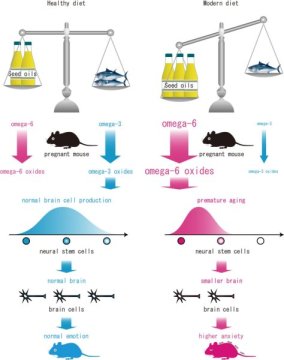We reach more than 65,000 registered users in Dec!! Register Now

How fish intake by pregnant women helps in the development of a child's brain
- January 18, 2016
- 967 Views
- 0 Likes
- 0 Comment
An explanation for the correlation between eating fish during pregnancy, and the health of the baby's brain, has been uncovered by a group of researchers. Dietary lipid contains fatty acids such as omega-6 and omega-3, which are essential nutrients for many animals and humans. The research group found that a balanced intake of lipids by pregnant women is necessary for the normal brain formation of the unborn child.
An explanation for the correlation between eating fish during pregnancy, and the health of the baby's brain, has been uncovered by a group of researchers. Dietary lipid contains fatty acids such as omega-6 and omega-3, which are essential nutrients for many animals and humans. The research group found that a balanced intake of lipids by pregnant women is necessary for the normal brain formation of the unborn child.
Researchers at Tohoku University's School of Medicine have found an explanation for the correlation between eating fish during pregnancy, and the health of the baby's brain.
Dietary lipid contains fatty acids such as omega-6 and omega-3, which are essential nutrients for many animals and humans. The research group, led by Professor Noriko Osumi, found that a balanced intake of lipids by pregnant women is necessary for the normal brain formation of the unborn child.
In an animal study, the researchers noticed that when female mice were fed an omega-6-rich/omega-3-poor diet, their offsprings were born with a smaller brain and showed abnormal emotional behavior in adulthood.
This is significant because people in many countries these days have similarly poor dietary patterns and tend to consume more seed oils that are rich in omega-6 fatty acids and less fish rich in omega-3 fatty acids.
According to Professor Osumi, the brain abnormality found in the offsprings of mice used in the study, was caused by a premature aging of fetal neural stem cells that produce brain cells. The premature aging was promoted by an imbalance of oxides of omega-6 and omega-3 fatty acids. The offsprings also showed higher anxiety levels, even though they were raised on nutritionally optimized diets from an early lactation period.
A diet that contains a good balance of omega-6 and omega-3 fatty acids is known to improve the development of brain functions; this is based on earlier researches that evaluated the effects of maternal intake of an omega-3-poor diet on brain function in children.
Omega-6 (n-6) and omega-3 (n-3) polyunsaturated fatty acids (PUFAs) are essential nutrients. Although several studies have suggested that a balanced dietary n-6:n-3 ratio is essential for brain development, the underlying cellular and molecular mechanism is poorly understood. Here, we found that feeding pregnant mice an n-6 excess/n-3 deficient diet, which reflects modern human diets, impairsed neocortical neurogenesis in the offspring.
The new study took this premise further and focused on the effects of dietary lipids on the brain formation. These findings provide compelling evidence that excess maternal consumption of n-6 PUFAs combined with insufficient intake of n-3 PUFAs causes abnormal brain development that can have long-lasting effects on the offspring's mental state. The results reveal why omega-6 and omega-3 balance is important for future brain function, and reinforces earlier suggestions that more fish intake by women during pregnancy can advantageously affect the child's health.
Source:
http://www.sciencedaily.com/releases/2016/01/160114113410.htm
Journal Reference:
Nobuyuki Sakayori, Takako Kikkawa, Hisanori Tokuda, Emiko Kiryu, Kaichi Yoshizaki, Hiroshi Kawashima, Tetsuya Yamada, Hiroyuki Arai, Jing X. Kang, Hideki Katagiri, Hiroshi Shibata, Sheila M. Innis, Makoto Arita, Noriko Osumi. Maternal dietary imbalance between omega-6 and omega-3 polyunsaturated fatty acids impairs neocortical development via epoxy metabolites. STEM CELLS, 2015; DOI: 10.1002/stem.2246









